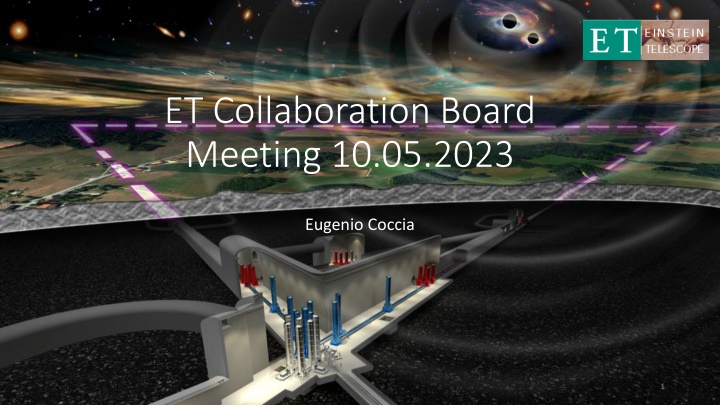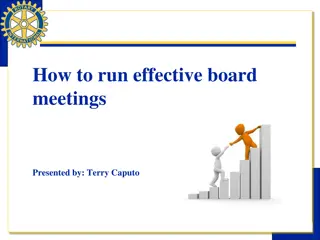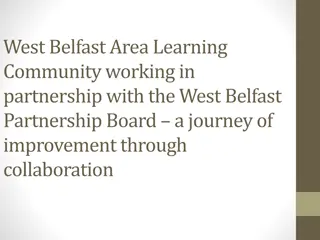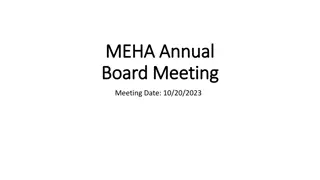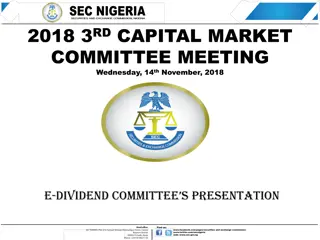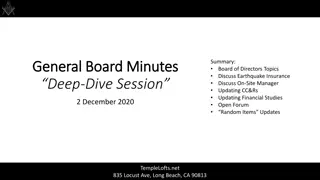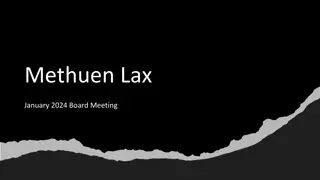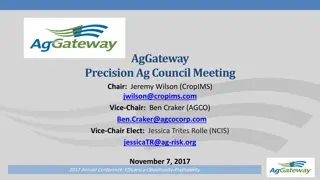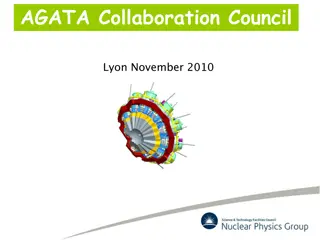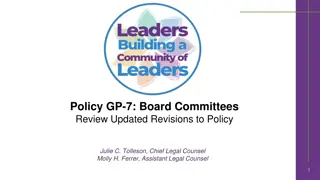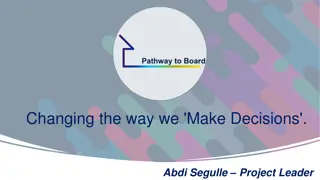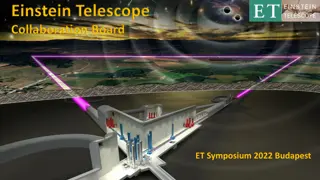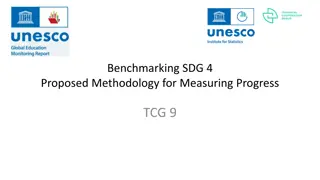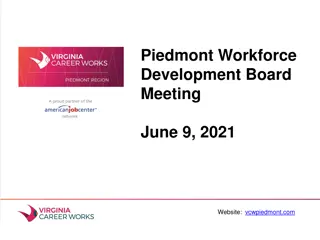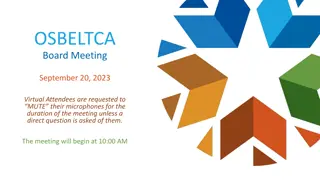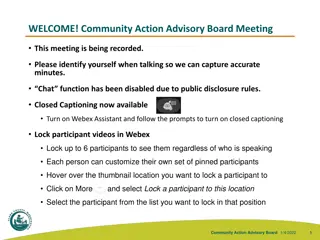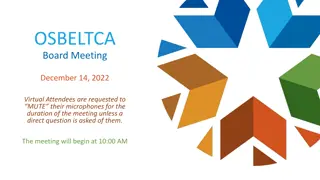Progress and Challenges in ET Collaboration Board Meeting
The ET Collaboration Board Meeting discussed the completion of the first year, upcoming Bylaws approval, committee activities, and the need for more discipline and proactive engagement. Important decisions and considerations for the future were addressed, emphasizing the importance of active participation and adherence to regulations.
Uploaded on Oct 05, 2024 | 0 Views
Download Presentation

Please find below an Image/Link to download the presentation.
The content on the website is provided AS IS for your information and personal use only. It may not be sold, licensed, or shared on other websites without obtaining consent from the author.If you encounter any issues during the download, it is possible that the publisher has removed the file from their server.
You are allowed to download the files provided on this website for personal or commercial use, subject to the condition that they are used lawfully. All files are the property of their respective owners.
The content on the website is provided AS IS for your information and personal use only. It may not be sold, licensed, or shared on other websites without obtaining consent from the author.
E N D
Presentation Transcript
ET Collaboration Board Meeting 10.05.2023 Eugenio Coccia 1
AGENDA Introduction by CB Chair Report from the Executive Board by the Spokesperson Application of a Brazilian Research Units (Riccardo Sturani) Status of the Bylaws (Harald Lueck) AOB
ET Collaboration nears completion of first year (9 June 2023) We are close (but not there yet) to having an official version of the Bylaws and of the tasks of the various committees under the Services and Standard Board. We must aim to complete and approve these texts, that are fundamental for the functioning of the Collaboration, by July. In the meantime, today we should discuss on some important details that will allow us to proceed unequivocally
ET Core Program Committee (CPC) ET Early Career Scientists Support Committee (ECSS) Diversity, Equity, Inclusion, Access and Ethics Committee (DEIAEC) Speakers and Awards Committee (SAC) Editorial Committee (EC) Collaboration Agreement Document Committee (CADC) Standards and Conduct Committee (SACC) Elections, Voting and Membership Committee (EVMC) Meetings and Symposia Committee (MSC)
Consideration Consideration The first year was a running-in period. We favoured the inclusion of new groups. In the absence of specific boards, of precise rules, we proceeded by acting sometimes without discussing/sharing actions properly. From July onwards we have to be: more disciplined in attending meetings, more willing to work on boards more proactive in intervening, discussing, contributing
The new Bylaws will have to be approved by the CB. Which CB? The current (incomplete) Bylaws read: When joining the ET Collaboration, RUs declare their FRTEs; in the first year they have one delegate in the Collaboration Board; from the 2nd year on, once the FRTEs are verified, they will have a number of delegates defined by the formula: The definition of the number of delegates should be based on a regular and synchronous verification performed every year. Questions: FRTE or FTE? Is the formula ok? The Bylaws will be approved (say) on June 12 (or at latest on July 10) by the present or by the new CB coming out by the formula? present CB composition
National Representatives to date 10.05.2023 Country NR Institute South Korea Chunglee Kim Ewha Womans University Taiwan Ray-Kuang Lee National Tsi Hua University France Patrice Verdier IN2P3 Switzerland Michele Maggiore University of Geneva Germany Mich le Heurs Leibniz Univ. Hannover Netherland Stephan Hild Maastrict University Italy Domenico D Urso Univ. Sassari & INFN Poland Marek Besiada Nat. Centre for Nuclear Res. Spain Nicanor Colino Ciemat Belgium Nick van Remortel Univ. Antwerp UK Hungry Bulgaria Let me solicit the nominations from UK, Hungry, Bulgaria
3.4 Forum of National Representatives 3.4 Forum of National Representatives Besides the management of the overall (global) ET Collaboration, there will be a need to organise need to organise matters at a national level, e.g. arrange for national R&D programs with funding agencies matters at a national level, e.g. arrange for national R&D programs with funding agencies. For high bandwidth information exchange and coordination high bandwidth information exchange and coordination, a Forum of National Representatives will be formed. The Forum of National Representatives (FNR) is The Forum of National Representatives (FNR) is composed of ET collaboration members composed of ET collaboration members elected by the elected by the RU leaders on a national basis. RU leaders on a national basis. There will be one representative per country. Its mandate is to discuss organisational and scientific discuss organisational and scientific aspects of the ET collaboration at a higher and more aggregate level compared to the CB aspects of the ET collaboration at a higher and more aggregate level compared to the CB. The FNR is chaired by the CB chair and the SP is regularly invited as observer. The FNR meets at least once per year The FNR meets at least once per year, it only has an advisory role advisory role, producing reports or vision documents, without decision power or voting rights in the Collaboration. The national representatives are regularly invited as observers to all CB meetings.
